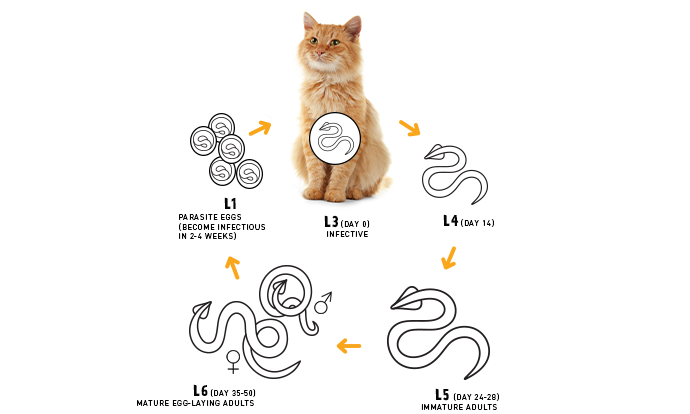
Antiparasitics
Parasites are not limited to just ticks and fleas
Pet’s health depends on comprehensive care. Effective parasite management plays a crucial role in keeping pets protected and thriving.
![]() Published on February 25, 2025
Published on February 25, 2025
Powered by

Why effective parasite prevention matters
Dogs and cats are exposed to a wide range of internal and external parasites throughout their lives. These parasites not only affect their health but can also pose zoonotic risks to humans.
For example, Echinococcus multilocularis is a parasite that can be transmitted to humans through contact with contaminated dog feces. This infection can remain undetected for years, before potentially leading to serious health complications. Regular deworming, especially for dogs with outdoor access or exposure to rodents, is a key step in reducing transmission risks.
A recent case of Echinococcus multilocularis has been confirmed in a dog in Ontario, highlighting a risk to both animal and public health.
A well-planned parasite prevention strategy should consider an animal’s lifestyle, age, and exposure risks to ensure optimal protection.
Parasites are not limited to just ticks and fleas
There are over 70 species of parasites that pose a danger to pets in North America. In Canada, some common types of parasites are: fleas, ticks, mites, lice, heartworms and intestinal parasites.
Pets can become infested in various ways. For example, fleas can jump up to 19 inches to latch onto cats when they ventures outside. As another example, a mosquito bite on a dog could transmit heartworms, which will migrate and live within the heart.
The right deworming for the right cat
Effective parasite management requires a tailored approach that considers the unique needs of each cat. Factors such as age, lifestyle, and physiological status—including pregnancy and lactation—should guide treatment decisions. Selecting a product specifically labeled for pregnant and lactating queens ensures safe and effective parasite control without compromising reproductive health.
A well-rounded parasite prevention strategy should also account for the types of intestinal worms most commonly present, including roundworms (Toxocara cati), hookworms (Ancylostoma tubaeforme), and tapeworms (Dipylidium caninum and Taenia taeniaeformis). Addressing both adult and larval stages helps reduce the risk of reinfestation, providing more comprehensive protection for feline patients. By adapting parasite treatments to the individual needs of each cat, veterinarians can ensure optimal health and well-being.


Why treating larval stages matters?
A comprehensive approach to parasitology effectively targets not only adult parasites but also their larval stages. Many dewormers focus solely on adult worms, leaving cats vulnerable to reinfection as immature parasites continue to develop. By addressing larval stages, a well-rounded parasite management strategy gives longer-lasting protection.
Additionally, parasite treatment protocols vary in frequency, with some products requiring biweekly administration. However, effective parasite management should also consider monthly protection, with solutions that offer control helping to reduce treatment frequency while maintaining efficacy.
Not all cats require an all-in-one internal and external parasite treatment—a tailored approach ensures that only the necessary medications are used, reducing unnecessary exposure to multiple treatments, minimizing the risk of resistance development and impact on the cat’s health. By adopting a flexible and targeted approach to parasitology, veterinarians can prioritize the health and well-being of their feline patients.
The right dewormer for the right cat: Ensuring that treatment aligns with a cat’s specific lifestyle and risk factors is essential for optimal parasite management.
Parasites are not limited to just ticks and fleas-because effective parasite management plays a crucial role in keeping pets protected. A well-rounded approach to parasite protection considers factors such as age, lifestyle, and potential exposure risks to ensure appropriate care for each pet.
By tailoring parasite management strategies to individual needs, veterinarians can provide targeted and effective solutions that support overall pet health. A proactive approach ensures that pets receive the right protection at the right time, helping them stay healthy year-round.
Good protection starts with a proactive approach
A personalized parasite management approach, including larval-stage treatment and solutions tailored to at-risk pets, ensures effective and lasting protection. Because the best dewormer is the one suited to each pet’s unique needs.



